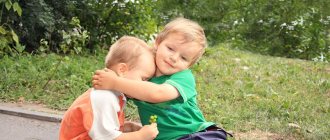MAGAZINE Preschooler.RF
“Formation of spiritual and moral values in preschool children”Author:
Migaleva Marina Vladimirovna, teacher of the preschool educational institution, combined kindergarten No. 1 Russia, Belgorod region, Alekseevka
Forming a child’s personality, instilling in him a correct attitude towards the environment and a certain moral position is a complex pedagogical process. To educate means to introduce certain spiritual qualities into a person, just as to nourish; to nourish means to introduce into the body its nutritional salts, physical and material substances. The basis of education is the correct, harmonious development of feelings.
Moral education is based primarily on universal human values that have developed among people over many hundreds of years of the existence of human society and are uniform and common to all people.
Universal human values are a reality. All people in a holistic, interconnected world. Everyone has a single, universal principle, one Earth and habitat; everyone equally needs clean air, water, soil, warmth and sunlight. In this sense, the human race has a sacred right to life, the right to exist, to develop and to self-determination. Many people forget that we all live in a world that is constantly changing. But with all this, we must not forget that there are “things” in the world that, in spite of everything, remain unchanged and are common to all people living on earth. At all times, people valued honesty, justice, mercy, love for mother, Motherland, camaraderie, kindness, integrity, and lies, hypocrisy, betrayal, callousness were considered qualities unworthy of “real people.”
What to base the upbringing of children on? Of course, on moral values.” Introducing a child to the values of universal human culture, developed over centuries, which have survived more than one generation of people and which carry within themselves the moral foundations that every person should be guided by in their life, is one of the most important conditions for the development of a child’s personality. What are the most important qualities we want to see in our children? Of course: politeness, delicacy, modesty, sociability,
discipline, sensitivity, tact, courtesy. These qualities are built on moral principles, therefore moral principles (kindness, honesty, mercy, etc.) should become the support of the teacher.
In the process of education, a strong philosophical and ethical foundation is necessary.
It will become possible to solve this problem only when the priority in education is given to the idea of developing a personality that is spiritually rich and morally fulfilled.
There are no ideal ready-made recipes in education; there may be general basic provisions that determine the degree of communication between the teacher and children,
guidelines in work, there should be possibilities for various options for organizing children.
When building his relationships with children, interacting with them, the teacher needs to know the psychological characteristics of his pupils, some mechanisms of psychological processes. “We must first of all understand the movements of a child’s heart,” St. John Chrysostom said more than once. [1, p. 52]
He who, in the name of his desires, casts aside the laws of conscience will never become a man and a citizen. And Christian education teaches that one of the most difficult tasks in preschool education is the disclosure of conscience. A person without conscience is a plague on society.
Psychologists and teachers emphasize that children’s feelings develop most intensively in preschool childhood. They can manifest themselves both in the child’s attitude towards himself (self-esteem, superiority: or, conversely, a feeling of inferiority, confidence or despair, etc.), and in relation to other people (sympathy or antipathy, sympathy, malice, anger, indifference , feelings of friendship, love, camaraderie, feelings of shame, guilt, etc.), to the team (solidarity), to art (aesthetic feelings). “A child of senior preschool age already develops the beginnings of complex feelings (justice, love for the Motherland, affection for children of other nationalities. Later this turns into more complex feelings.” [3, p. 342]
For the formation of a child’s feelings and his normal development, cultivating an emotionally positive attitude towards the environment is of great importance. The child is emotionally responsive to what is happening around him; through emotions and feelings, the preschooler forms many ideas about various phenomena of the world around him. Not only the formation of his ideas, but also the desire to act in the current situation in accordance with these ideas depends on what emotions the child develops and what feelings he experiences. Positive emotional states are the basis for a friendly attitude towards people and a willingness to communicate. Negative emotional states can “cause bitterness, envy, fear, alienation, because raising children is a risky business. An act that was born from a moral feeling and impulse first experienced enters into the child’s moral experience and will create the basis for the repeated manifestation of such feelings in similar circumstances, i.e. The motives for the child’s moral behavior must be taken into account.”
At preschool age, moral feelings begin to form, which are important for the development of children's relationships. Children already in their third year of life may exhibit such personality traits as sociability or shyness, independence or lack of self-confidence, selfishness or goodwill, and attentive attitude towards friends. The development of feelings in a child largely depends on the means and methods of education, on the conditions in which he participates. With purposeful education
a child’s feelings are much richer, more varied and appear earlier than in children who have not received the right upbringing. And as A.S. said Pushkin: “Lack of education is the root of all evil.”
“A child gains initial ideas about relationships between people by observing the relationships of the adults around him. Their behavior, as well as their attitude towards him and his actions, becomes like a behavior program for the kids. Based on the model given by adults, he builds his relationships with people.” .
It is important that in preschool childhood the child experiences maximum positive emotions. [4, p. 120]
The task of instilling moral feelings in children is solved the more successfully the more humane the adults themselves are, the kinder and fairer they treat children. “All teachers of our time agree that in the matter of education the most important thing is to acquire the trust and love of a child, and that love is won primarily by love.”
Of course, a gentle, kind attitude towards a child does not at all mean a lack of demands. Only a reasonable combination of love and exactingness gives the desired results; children increase their desire to behave better, achieve success in all matters, and gain confidence in their strengths and capabilities. But it should be noted that demandingness as such can only be possible with children in older preschool age. And the younger the child, the more direct his moral education should be, the more he should not be taught, but accustom him to good feelings, inclinations and manners, basing everything primarily on habit.
One of the most important conditions for the successful development of a child’s moral feelings is the creation by adults of a cheerful environment around him. You should never extinguish children's joy. In an atmosphere of joy, such valuable spiritual qualities as goodwill, willingness to help, etc. easily arise. In a state of joy, it seems to the child that everything is available to him, he willingly takes on the work he has started, he develops a feeling of confidence in himself and his strengths, he becomes more active, and readily carries out work assignments, helping adults. It is important that adults correctly assess the child’s state of mind and share his joy.
Raising a small child begins with instilling in him useful habits that organize his behavior and communication with adults and peers.
The moral concepts that lie behind external forms of behavior are not immediately comprehended by him, and therefore represent the greatest difficulty for the teacher and parents in forming the moral foundations of behavior in the child.
The problem of the spiritual development of the individual, the growth of his moral level remains relevant for modern teachers. Events taking place around us indicate the need to solve the problem of spiritual and
moral development of society. All this makes the problem of forming moral ideas in preschoolers relevant and significant in a modern children's institution.
Educators need to teach the child to make the right moral choices.
Of course, speaking about children, it is too early to talk about the formation in them of such qualities as honesty, courage, kindness, etc. However, what is created by communication is no less important. This is a feeling of emotional well-being, warmth and comfort in a new and unfamiliar world. Society offers the child certain norms and requirements. It’s just a matter of “small things”: making them comply. And for now there are only two ways to achieve this: either arrange it so that the child himself wants to fulfill this or that norm of behavior, or force him. The first is preferable, but more difficult. After all, the desire to be kind and fair is not yet realized by a child. But it is worth clarifying that young children are not capable of real moral behavior, but for the sole reason that they lack highly developed or abstract reasoning skills. young children, without any training, take care of others.
And if adults make mistakes in upbringing, then the child may lose all his positive qualities. Or at best, for certain reasons, simply not use them. And then adults begin to use the second way in education, forcibly forcing the child to adhere to moral qualities, which, naturally, at best, leads to nothing.
But still, let's focus on the first path, where the main task of adults is to direct excessive children's activity and energy in the direction we need, i.e. teach to live according to moral principles. But this is precisely the main difficulty.
How to educate the basics of moral feelings in preschoolers? How to instill in them the desire to perform moral actions of their own free will, and not because of any benefit, or out of fear of us, adults.
Many representatives of various pedagogical concepts try and put a lot of effort into instilling in children from an early age a passionate desire for beauty, turning them away from the ugliness of chaos, which opposes harmony and order, and raising children in accordance with their natural abilities.
The main thing is obvious - if parents fix their attention on all aspects of harmony, then their children will most fully perceive the ideal of beauty.
Mothers and fathers should use the main method of developing morality - having conversations in the family. The conversations themselves should be well planned, and a new topic of discussion should be chosen each time. It is best to tell: a story about animals, fables, fairy tales, etc., giving examples from life - all this gives information about the world, about norms of behavior, and develops the characteristics of children’s thinking and feelings.
The child will develop empathy, responsiveness, and the ability to put himself in the place of another person in order to understand: what is unpleasant for us is unpleasant for him. Teachers constantly have to remind parents of all this.
To do this, it is necessary to conduct conversations, consultations, joint leisure activities and competitions between parents and children, display the necessary information on stands, and much, much more...
We must always be sensitive, not interfere in the lives of other people, not hurt their honor. We must love people, treat their dignity as carefully as our own, because... only then can we be worthy representatives of the human race. These qualities are called human perfectibility and moral virtues. Anyone who does not possess such traits will never fulfill his destiny as a human being and may even become worse than an animal, for an animal will never commit such acts as an immoral person does.
We see that morality largely depends on the cultivation of a healthy conscience. Admittedly, raising children and teaching them good manners from childhood requires patience and strength. If this task were easy, then we would not see such a difference between cultured and uncultured people. If human behavior improved over time, with the acquisition of experience, then there would be no need to spend so much effort on it, and people would grow like trees in a forest. Biologically, a person, of course, develops on his own, but this is not enough. The development of moral and spiritual abilities depends entirely on education.
Bibliography:
- Bogdanova A. “Black vestments will not save us, white vestments will not destroy us...”. About the worldly feat of Juliania Lazareva.: Scenario of a literary and spiritual lesson. Spiritual and moral education 2004, No. 1, pp. 48-56.
- Vidyakova Z.V. Pedagogy and anthropology in the teachings of St. Tikhon of Zadonsk - M.: Peresvet, 2004 - 42s
- Spiritual origins of education. Almanac, No. 1, 2002 - M.: Moscow publishing house. Patriarchate, 2002- 4. Shestun E., Archpriest Orthodox pedagogy: Textbook. Benefit. - M: Orthodox pedagogy, 2002-575.
- 160c Slyarova T.V., Yanushkevicheva O.L. Developmental pedagogy and psychology: Proc. Benefit. - M.: Pokrov, 2004- 142s
- Spiritual origins of education. Almanac. Thematic issue: Orthodox culture at school. - M.: Publishing house Moscow. Patriarchies, 2003 - 170 p.
| Next > |
Spiritual development of a child
Human spirituality is a complex harmonious combination of personal qualities and mental properties, which form the basis for mental and personal improvement. A logical question arises: what are the signs of the development of spirituality, or, to put it differently, what exactly in the thoughts, feelings, and actions of a child gives reason to state whether this process is going on?
Human improvement can be traced by observing positive changes in the components of spirituality:
• In the mental (intellectual) - from cognition of objects with the help of the senses, to understanding their essence, interrelation, the ability to independently solve intellectual tasks of varying complexity;
• In the sensory-emotional - from simple emotions (surprise, joy, sadness, envy), to the ability to love, empathize, sympathize;
• In the humanistic - from childish egoism, egocentrism, to altruism, humanism, that is, the desire to do something for other people, maybe even yielding to one’s own interests;
• In effective-volitional - from involuntary actions to meaningful actions, the ability to manage one’s behavior;
• In the aesthetic component - from simple contemplation of aesthetic objects, natural phenomena, to the need to create beauty with one’s own hands or through one’s own efforts, the ability to experience a feeling of satisfaction from beauty.
Consequently, the development of a child’s spirituality is a complex, long-term, but extremely urgent problem, and it is called upon, first of all, to solve it by psychologists, teachers, parents, that is, those people in whose hands the future and fate of a person just entering life are in their hands.
Where does Man begin? From purely human activities? From his actions regarding other people? Apparently this is true. But the problem is that the child should develop such needs that would encourage him to spiritual, humane actions and activities. After all, as psychologists have proven, it is needs that push a person to activity.
Therefore, the first step in educating a Man is the development of his spiritual needs - in communication, knowledge of himself and the Universe, aesthetic satisfaction, the need for charity.
Some teachers and parents have the mistaken opinion that a child who has been deprived of maternal care and affection will grow up sensitive to human suffering, sympathetic and kind. However, psychological research shows that a lack of love, respect, care causes the formation of indifference, and even aggressiveness.
Science knows for sure that a person who wants to do good is capable of empathy if he feels safe and emotionally “warm” from birth. Already in the first days of life, attentive parents observe that the child has a need for love. To satisfy it, the baby needs an atmosphere of harmony in the family, varied communication, he needs a sensitive, gentle attitude, emotional comfort, and a feeling of significance for the adults around him.
The source of the development of spirituality is, undoubtedly, communication, in particular spiritual communication - the exchange of opinions, knowledge, feelings, impressions, interests. This subtlest and most complex type of communication begins early in a child’s life.
In its mature form, spiritual communication becomes possible provided that people have interest and trust in each other. If parents become interesting to a child, the child develops a need for communication quite early. And later, there is only one thing left for parents - not to lose the trust of their son or daughter.
One of the first, with the assistance of parents, children develop another spiritual need, which is to expand knowledge about the environment and themselves. If it receives constant support from adults, the cognitive need subsequently turns into curiosity, a personality trait that is considered the basis for the development of thinking.
Speaking about the development of spirituality, it is necessary to emphasize the need to form a unique, purely human need to perceive and create beauty, that is, an aesthetic need. For its development, it is necessary to have appropriate attention from adults to the peculiarities of the child’s perception of aesthetic objects and phenomena, as well as the purposeful use of appropriate forms of educational work, including visits to museums and exhibitions, theaters, as well as the child’s own creativity.
Experts consider humanity to be the highest indicator of spiritual development - an attitude towards any form of life as the highest value, and a selfless perception of the life of another person (being). The psychological basis for the development of humanistic qualities of an individual is the need for charity. Apparently, this is the most significant human need. The complexity of its formation is due to the fact that young children are egocentric by their psychological nature. That is, they perceive themselves as a certain center of life and attention of adults, which really corresponds to reality. Therefore, parents have an important task: to convince the baby that, besides him, there are other people, children, creatures who also need attention, help, and, moreover, also have the need to do good.
Formation of spiritual and moral values in preschool children
The article examines the formation and development of spiritual and moral values in preschool children in the family, based on customs and traditions; social institutions: preschool educational organizations, schools, mahallas: complementing and supporting educational work for the purpose of the spiritual and moral development of children; as well as awakening spirituality by introducing them to the spiritual heritage of the past.
Key words : spirituality, morality, customs, family, mahalla, spiritual heritage, personality formation.
The article discusses the formation and development of spiritual and moral values in children of preschool age in the family, on the basis of customs and traditions; social institutions: preschool educational organization, school, mahalla: complementing and supporting educational work for the purpose of spiritual and moral development of children; as well as the awakening of spirituality by familiarizing them with the spiritual.
Key words : spirituality, morality, customs, family, mahalla, spiritual heritage, personality formation.
Spirituality is the source of human growth and power.
I. A. Karimov
Every parent wants their child to grow up healthy, happy, cheerful and smart. Teachers help with this, not only in the quantitative development of the child, but also in qualitative terms. That is, when we talk about the qualitative development of a child, we mean his mental, spiritual and moral development. Raising the younger generation in accordance with spiritual and moral standards is significant for the further prosperity of society. And the main unit of society is the family, in which favorable conditions are created for raising children, introducing them to spiritual, universal values and traditions.
The family is the basic unit of society. Education begins in the family, where a person goes through the initial stage of socialization - for the first time he learns what is good and what is bad, what is possible and what is not, learns to be kind, fair and responsible, appreciate the support of others and help others. And the child copies the behavior of his parents, introduces it into his life tactics, so it is worth being an example for your own children, starting with yourself: doing more good deeds. There is a proverb: “The bird does what it sees in its nest.” Even if an adult says that swearing and fighting are bad, but he himself fights, his words will not have any effect, the child most often imitates our actions.
The rights and responsibilities of parents to raise children are established in the Constitution of the Republic of Uzbekistan. Article 73. Rights and responsibilities of parents regarding the upbringing and education of children: “ Parents have the right and obligation to raise their children. Parents are responsible for the upbringing and development of their children. They are obliged to take care of the health, physical, mental, spiritual and moral development of their children" [1]
Uzbek families raise their children in such a way that the result of this upbringing bears fruit not only for the parents, but also for the Motherland. They are taught to respect elders, say hello (in Uzbek families, special attention is also paid to the culture of greeting), thank and ask for forgiveness for their actions. Effectiveness in the formation of spiritual and moral qualities in preschool children is also achieved in large families.
These are families where several generations live together and live together. For example, mom, dad, their parents, grandparents and children. Children who grow up with grandparents differ greatly in their intelligence, attentiveness and sensitivity, and they also have a rich vocabulary.
Preservation and transmission of cultural values and family traditions ensures strong bonds between generations and within the family. In a family where traditions and customs are sacredly respected, relationships between partners are stronger and more respectful than where this is not the case. Through traditions and customs we learn folk values.
Rice. 1.
Custom is a stereotypical way of behavior that is reproduced in a certain society or social group and is familiar to its members. It can be noted that traditions, customs, and rituals are the main part of folk culture and this directly affects the spiritual and moral education of children.
The level of spiritual and moral development and education of a person is the basis of any of his actions, forms his aura (shell, appearance), determines the system of personal values and character. The process of moral development of preschool children has its own peculiarity. A child’s spiritual and moral ideas, knowledge and skills in preschool age are characterized by the fact that he begins to form initial moral judgments and assessments. The preschooler begins to understand what a moral norm is and forms his attitude towards it. Children at this age are able to use words in their speech that denote moral qualities and their opposites (good - evil, greedy - unselfish, honest - deceitful, etc.)
Morality is the internal (spiritual and emotional) qualities of a person, based on the ideals of goodness, justice, duty, honor, etc., which are manifested in relation to people and nature. [3]
Moral education is a purposeful process of introducing children to the moral values of humanity and a particular society.
An important method of moral education is example. This is due to the special sensitivity and flexibility of the nervous system of preschool children. The child involuntarily, imitatively learns the behavior of the people around him. He strives to work as deftly and accurately as a teacher. [3]
Thus, social institutions: preschool educational organizations, schools, mahallas - help, support and complement educational work for the purpose of the spiritual and moral development of children. The question arises: why mahalla? An important factor in the spiritual development of society is the mahalla. It is a kind of mirror of the spiritual climate and situation in our country. In the makhalla community, a child’s social consciousness is enriched through the life experience of elders, the personal example of elders, and norms of collective behavior. Mahalla preserves and develops national, cultural, historical, spiritual and moral values; educates the younger generation in the spirit of love for the Motherland.
In the Republic of Uzbekistan, training and education have long been associated with the development of the spiritual and moral qualities of the younger generation. The goal of spiritual and moral education is the formation of a comprehensive, harmoniously developed personality. There is no single concept of spirituality; there are different definitions and some common features can be identified in them.
Spirituality is a criterion (measurement) of all a person’s views, it is an immeasurable force that awakens conscience, calls a person to spiritual purification and enrichment, strengthens the will, the inner world of a person, forming the integrity of faith and beliefs. [3]
Rice. 2. Formation of positive qualities in children
To awaken spirituality in preschool children, it is no less effective to familiarize them with the spiritual heritage of the past: the life and deeds of the great ancestors of the Uzbek people. Great fighters for the independence of the Motherland like Spitamen, Jalaliddin Manguberdy, the great commander Amir Temur. The best examples of national spiritual heritage, scientific, religious and secular views of great ancestors and pearls of world culture: freedom-loving ideas of great thinkers, the concept of a just society of Al-Farabi, the world discoveries of Al-Khorezmi, Al-Ferghani, the scientific feat of Al-Beruni, the great works of Ibn -Sina (Avicenna), Ulugbek, Alisher Navoi’s views on the problem of human perfection. [2]
In conclusion, we can say that the spiritual and moral development of personality occurs throughout life. At preschool age, the most favorable conditions are created for the spiritual and moral development of children. A preschooler comprehends the world of human relations, discovers the laws by which human interaction is built, i.e. norms of behavior. In an effort to become an adult, a preschooler subordinates his actions to social norms and rules of behavior.
Literature:
- Constitution of the Republic of Uzbekistan. 1991
- I. A. Karimov “High spirituality is an invincible force” 2008
- Ozhegov Explanatory Dictionary 2007
Prayer
1. The day of all family members begins and ends with prayer. For children, the rule may consist of several short prayers, for example the so-called. “the usual beginning” (morning prayers and prayers for those to come begin with it) in any prayer book.
2. Prayer before and after meals is a powerful means of spiritual education.
3. Before breakfast, it is customary to eat a small piece of prosphora (it can be purchased at the church and cut) and holy water (you can always get it at the church) with the prayer “For the acceptance of the prosphora and holy water.”
4. When a child leaves the house (and also before going to bed), he needs to be crossed with prayer. For example, this: “Lord, bless” or “Protect (the name of the child), Lord, by the power of Your Honest and Life-giving Cross and save him from all evil.” Or: “Lord Jesus Christ, Son of God, bless, sanctify, preserve by the power of Your life-giving Cross”; If you have an obstinate teenager, then you can do it after him, so that he does not see.
5. Don't impose a big prayer rule on your child. When teaching prayer, attention and sincerity are especially important.
6. It makes sense to add prayers to the prayer rule depending on the circumstances: holidays, a holy day, fasting, someone’s illness, some joyful or sad event.
7. When praying at home, light a candle or lamp; it is advisable that this be the child’s responsibility.
8. Do not pray late, when the child dreams only of sleep and his attention is relaxed.
9. The child should be taught short prayers: “Lord bless”, “Glory to Thee, Lord”, “Lord have mercy”, “Most Holy Theotokos, save us”, “Glory to God for everything”; “Lord, bless me for my studies” (sincerely, not automatically).
10. Help your child make a memorial. All the names there should be written only by himself according to his own heart, because this is his memorial.
11. There should be icons in the child’s room (as well as in other rooms and the dining room). The main and larger icon should be the icon of the Savior or the Holy Trinity.
Spiritual reading
1. You should read the Gospel daily. Since ancient times, teaching the basics of faith has been the responsibility of the father. It is advisable to make this a nightly tradition. Nowadays, there are many manuals for the religious education of children.
2. It is also useful to read the lives of saints, adapted for children. The child should not be a passive listener; after reading, he should discuss what he read and ask questions. It is important to show the saints not as legendary heroes of bygone times, but as our eternal mentors and helpers to whom we can turn. Show what was most important in the lives of all these great people.
3. A useful tradition for children and adults is to daily write out and memorize a verse that touched the heart from a chapter of the Gospel read.









